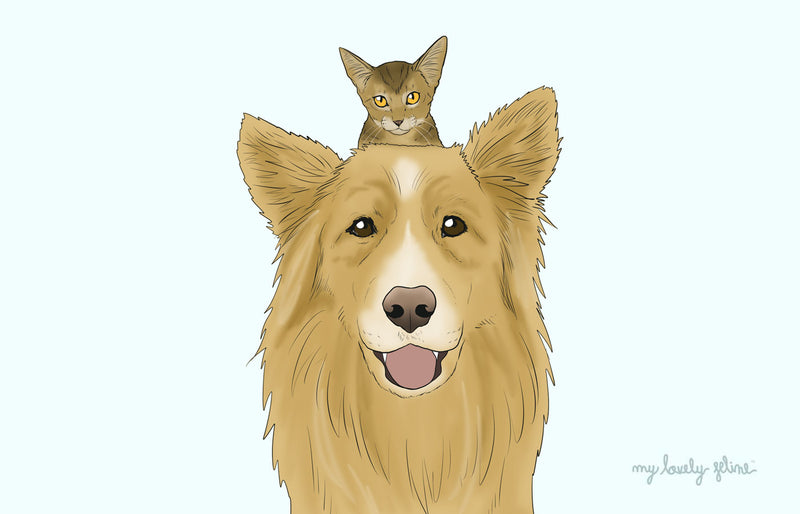|
It's a debate that has raged on for ages, with both sides fiercely defending their beloved pets. But there's one argument that seems to come up time and time again: which pet is cleaner, cats or dogs? Some people swear by their feline friends, claiming they're self-cleaning and always groomed to perfection. Others argue that dogs are the cleaner option, with their regular baths and the fact that they don't use litter boxes. So, who's right? In this article, we'll explore the cleanliness debate between cats and dogs, looking at the facts and debunking some myths along the way. Whether you're a cat lover, a dog enthusiast, or simply curious about the topic, keep reading to find out which pet truly reigns supreme in the cleanliness department. |
The Cleanliness of Cats
Cats are often lauded for their cleanliness, and for good reason. They spend a significant amount of their day grooming themselves, using their rough tongues to remove dirt and debris from their fur. This grooming not only keeps them clean but also helps regulate their body temperature and promotes healthy circulation.
Additionally, cats have scent glands on their face, paws, and tail, which they use to mark their territory and communicate with other cats. Regular grooming also helps keep these scent glands clean and functioning properly.
While cats are adept at keeping themselves clean, they still require some assistance from their human companions. Regular brushing can help reduce shedding and prevent hairballs, while regular nail trims can help prevent scratches and damage to furniture. It's also important to keep their litter box clean, as dirty litter boxes can lead to unpleasant odors and even health problems for both cats and their human companions.
Despite their reputation for being clean animals, cats can still carry harmful bacteria and parasites. For example, cats can carry Toxoplasma gondii, a parasite that can cause toxoplasmosis, a disease that can be dangerous for pregnant women and individuals with weakened immune systems. It's important to practice good hygiene when handling cat litter, including wearing gloves and washing hands thoroughly afterward.
The Cleanliness of Dogs
Dogs, on the other hand, are often seen as messier animals than their feline counterparts. They love to roll around in the dirt, play in puddles, and explore the great outdoors. However, this doesn't necessarily make them dirty animals. In fact, many dogs are quite fastidious when it comes to their grooming habits.
While dogs don't groom themselves in the same way that cats do, they still require regular grooming to keep their coats healthy and clean. This includes regular brushing, bathing, and nail trimming. Some breeds may require more frequent grooming than others, depending on the length and texture of their fur.
One thing that sets dogs apart from cats in terms of cleanliness is their lack of litter boxes. Dogs are trained to do their business outside, which means there's no need to deal with litter boxes or the unpleasant odors that can come with them. However, this doesn't mean that dogs are immune to accidents or messes. It's important to properly clean up after dogs and dispose of waste in a responsible manner.
The Impact of Cat and Dog Cleanliness on Human Health
The cleanliness of our pets can have a significant impact on our own health and well-being. For example, pets that are not properly groomed or kept clean can contribute to the spread of bacteria and parasites, which can lead to illness. Additionally, pets can shed dander, hair, and other allergens, which can trigger allergies and asthma in some individuals.
Cats and dogs both have the potential to carry harmful bacteria and parasites, but there are steps that can be taken to reduce the risk of transmission. This includes regular grooming and cleaning of living areas, as well as practicing good hygiene when handling pet waste or interacting with pets.
Despite the potential health risks associated with pets, there are also many benefits to pet ownership. Studies have shown that pets can help reduce stress and anxiety, lower blood pressure, and even boost our immune systems. Additionally, pets provide companionship and unconditional love that can be invaluable to our mental and emotional well-being.
The Benefits of Owning a Clean Cat
Owning a clean cat can have many benefits, both for the cat and their human companions. A clean cat is less likely to develop skin problems or other health issues related to poor grooming habits. Additionally, regular grooming can help reduce shedding and prevent hairballs, which can be unpleasant for both cats and their human companions.
A clean litter box is also important for maintaining a healthy and happy cat. Cats are very particular about their litter box habits, and a dirty box can lead to stress, anxiety, and even health problems. Regular cleaning of the litter box can help prevent these issues and keep your cat happy and healthy.
Finally, owning a clean cat can help reduce the risk of transmission of harmful bacteria and parasites. Regular grooming and cleaning of living areas can help prevent the spread of these pathogens, keeping both cats and their human companions healthy.
The Benefits of Owning a Clean Dog
Owning a clean dog also comes with many benefits. Regular grooming can help keep their coat healthy and shiny, while also preventing skin problems and other health issues. Additionally, regular baths and nail trims can help prevent odors and keep your dog looking and smelling fresh.
By training your dog to do their business outside, you can also avoid the need for litter boxes and the unpleasant odors that can come with them. This can make living with a dog a more pleasant experience for both the dog and their human companions.
Finally, owning a clean dog can help reduce the risk of transmission of harmful bacteria and parasites. Regular grooming and cleaning of living areas can help prevent the spread of these pathogens, keeping both dogs and their human companions healthy.
Common Misconceptions About Cat and Dog Cleanliness
There are many misconceptions about the cleanliness of cats and dogs that can lead to confusion and misinformation. For example, some people believe that cats are always clean and never require grooming, while others believe that dogs are inherently dirty and require constant baths.
In reality, both cats and dogs require regular grooming and cleaning to maintain their health and well-being. The frequency and type of grooming required may vary depending on the breed and individual animal, but all pets require some level of maintenance to stay clean and healthy.
Another common misconception is that cats are more likely to spread diseases than dogs. While cats can carry harmful bacteria and parasites, dogs are also capable of transmitting these pathogens. It's important to practice good hygiene when interacting with both cats and dogs to reduce the risk of transmission.
Tips for Keeping Your Cat or Dog Clean
Keeping your cat or dog clean and healthy requires some effort, but it doesn't have to be a difficult or time-consuming task. Here are some tips for keeping your pet clean and healthy:
- Regular grooming: Both cats and dogs require regular grooming to keep their coats healthy and clean. This includes brushing, bathing, and nail trimming.
- Clean living areas: Regular cleaning of litter boxes and living areas can help prevent the spread of harmful bacteria and parasites. Use pet-safe cleaners and disinfectants to keep your home clean and healthy.
- Proper waste disposal: Dispose of pet waste in a responsible manner, and always wash your hands thoroughly after handling it.
- Regular veterinary checkups: Regular checkups with a veterinarian can help ensure that your pet is healthy and free of disease.
The Importance of Regular Veterinary Checkups
Regular veterinary checkups are an essential part of keeping your pet healthy and happy. During these checkups, a veterinarian can assess your pet's overall health, check for signs of illness or disease, and provide preventative care such as vaccinations and parasite prevention.
Regular checkups also provide an opportunity to discuss any concerns or questions you may have about your pet's health or behavior. By working with a veterinarian, you can ensure that your pet receives the best possible care and lives a long and healthy life.
Conclusion
The cleanliness debate between cats and dogs is a complex and nuanced issue. While cats are often seen as inherently clean animals, dogs also have the potential to be clean and well-groomed. The key to keeping both cats and dogs healthy and happy is regular grooming, cleaning, and veterinary care. By practicing good hygiene and providing your pet with the care they need, you can enjoy the many benefits of pet ownership while minimizing the risks associated with pet-related illnesses and diseases.




